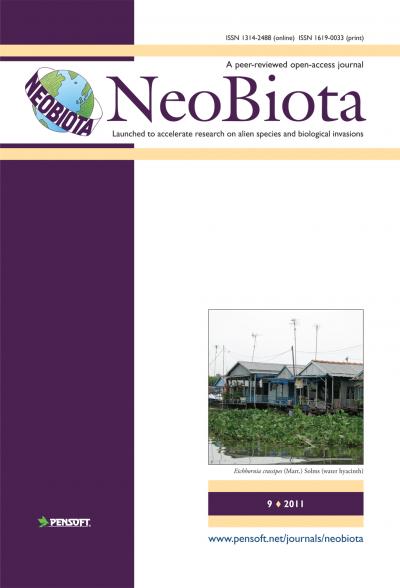Chelonian challenge: three alien species from North America are moving their reproductive boundaries in Central Europe
IF 3
2区 环境科学与生态学
Q1 BIODIVERSITY CONSERVATION
引用次数: 0
Abstract
Biological invasions by alien species have substantial economic impacts and are a major driver of the ongoing decline and loss of biodiversity. Through humans, the North American pond slider (Trachemys scripta) has acquired a global distribution over the last decades and is currently listed among the worst invasive reptile species. However, in more recent times, other freshwater chelonian species have increasingly been recorded far outside their native distribution ranges as well, not only on the same continent but also on others. Despite that, the impact of alien chelonians on their respective new ecosystems remains unclear. The long-term effects and severity of impacts of alien populations mostly depend on whether they ultimately succeed in establishing themselves. This is not entirely resolved for chelonians in Central Europe. To answer that, we investigated wild populations of three non-native chelonian species from North America in Germany (Pseudemys concinna, Graptemys pseudogeographica and Trachemys scripta) applying population genetic approaches. We revealed the successful reproduction of all three species in Germany and provide the very first record for the reproduction of P. concinna and G. pseudogeographica in a temperate continental climate zone outside their native distribution. Based on our unambiguous evidence of natural reproduction, we call for dedicated studies to verify how widespread established populations are and to investigate the existing and potential impacts of all three species in a range of ecosystems along a climatic gradient. Such data is urgently needed to revise the current risk assessments of non-native chelonians, especially in Central European countries.切隆挑战:三个来自北美的外来物种正在中欧移动它们的繁殖边界
外来物种的生物入侵具有重大的经济影响,是生物多样性持续下降和丧失的主要驱动因素。通过人类,北美池塘滑块(Trachemys scripta)在过去的几十年里获得了全球分布,目前被列为最严重的入侵爬行动物物种之一。然而,在最近的时间里,其他淡水龟物种也越来越多地在远离其本地分布范围的地方被记录下来,不仅在同一大陆,而且在其他大陆。尽管如此,外来的龟类动物对它们各自的新生态系统的影响仍不清楚。外来人口的长期影响和影响的严重程度主要取决于他们最终能否成功地定居下来。对于中欧的chelonians来说,这并没有完全解决。为了回答这个问题,我们采用群体遗传学方法对3种来自北美的非本地龟种在德国的野生种群(pseudomyys concinna, Graptemys pseudogeography和Trachemys scripta)进行了调查。我们在德国发现了这三个物种的成功繁殖,并首次提供了在温带大陆性气候区繁殖的记录。基于我们对自然繁殖的明确证据,我们呼吁进行专门的研究,以验证已建立种群的分布范围,并调查这三种物种在一系列气候梯度生态系统中的现有和潜在影响。迫切需要这些数据来修订目前对非本地龟的风险评估,特别是在中欧国家。
本文章由计算机程序翻译,如有差异,请以英文原文为准。
求助全文
约1分钟内获得全文
求助全文
来源期刊

Neobiota
Agricultural and Biological Sciences-Ecology, Evolution, Behavior and Systematics
CiteScore
8.10
自引率
7.80%
发文量
0
审稿时长
6 weeks
期刊介绍:
NeoBiota is a peer-reviewed, open-access, rapid online journal launched to accelerate research on alien species and biological invasions: aquatic and terrestrial, animals, plants, fungi and micro-organisms.
The journal NeoBiota is a continuation of the former NEOBIOTA publication series; for volumes 1-8 see http://www.oekosys.tu-berlin.de/menue/neobiota
All articles are published immediately upon editorial approval. All published papers can be freely copied, downloaded, printed and distributed at no charge for the reader. Authors are thus encouraged to post the pdf files of published papers on their homepages or elsewhere to expedite distribution. There is no charge for color.
 求助内容:
求助内容: 应助结果提醒方式:
应助结果提醒方式:


